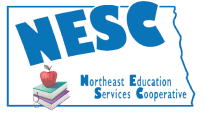NESC ConnectEd
We proudly support North Dakota educators in their efforts to provide high-quality, extended day programming for students through lessons and instructional resources in the focus areas of STEAM & Problem-based Learning, 21st Century Skills & the 4Cs, and Career Exploration & Community Partners.
- Access a wide variety of archived lessons and resources from instructional partners across North Dakota!
- Opportunities for grades K-2, 3-5, and 6-8 are available!
- Check out everything NESC ConnectEd has to offer here!
Building Tomorrow's Leaders
Contact Erin Lacina for more information.
SCRUBS Camp (5th Graders)
The R-COOL-Health Scrubs Camp is an exciting program supported by the Center for Rural Health (CRH) at The University of North Dakota School of Medicine and Health Sciences focused on rural students in grades 5-12. The NESC has hosted a camp since 2011. The overall purpose of the program is to increase awareness, interest, and understanding of health careers available in rural North Dakota through creative and interactive activities. The NESC SCRUBS Camp is specifically for students in 5th Grade. The camp is held at Lake Region State College (LRSC) and the Lake Area Career and Technology Center in Devils Lake. Each year, approximately 300 students from the NESC region attend the camp, which is one of 8-10 camps funded each year in ND through the grant from the CRH. Students are able to attend at least seven sessions on various health-care related topics from professionals who volunteer their time for this special event. Key connections for the camp are the NESC, LRSC, Altru Clinic DL, CHI St. Alexius DL Hospital, Forward Devils Lake, Lake Region Search & Rescue, and Devils Lake Public Schools Counseling Department.
For more information contact: jennifer.carlson@nescnd.org
You're Hired!
You’re Hired! is a project that allows students to use STEM (Science, Technology, Engineering, and Math) along with 21st-century skills to solve real, present-day problems. Students will work as a team (company) to find a solution and present their proposals to a boardroom. The NESC facilitates You’re Hired! events for students in grades 3-12 across the region.
Learn more about our Spring 2024 events at https://conta.cc/48RqF8N, and schedule an event at your school by contacting Cortney.Shuley@nescnd.org.
NESC 21st Century Community Learning Centers (CCLC)
NESC 21st Century Community Learning Centers (CCLC): The NESC eligible member schools jointly apply for a 21st CCLC Grant which is under the direction of Jennifer Carlson. Schools in the NESC 21st CCLC Grant include Dakota Prairie Public School, Devils Lake – Central Middle School, Minnie H Kindergarten Center, Prairie View Elementary, and Sweetwater Elementary, Fessenden-Bowdon Elementary School, Fort Totten – Tate Topa Elementary and Middle School, Langdon Public School, Midkota Elementary School, Minnewaukan Public School, Mount Pleasant-Rolla Public School, Rolette Public School, and Warwick Public School.
For more information, email jennifer.carlson@nescnd.org
NESC Summer School
Offered through Devils Lake High School to NESC Member School Districts.
Contact the Devils Lake High School Principal for more information at 701-662-1200.
Technology Learning Cooperative
Technology Learning Cooperative: A consortium of 21 schools that shares in the rotation of high tech equipment which is used in various 7-12 classrooms to enhance existing curriculum. For more information contact: jennifer.carlson@nescnd.org
Transition Resources
Self-advocacy units were developed by the NESC in partnership with Lake Region Special Education through the 2019-2020 North Dakota Department of Public Instruction’s Transition Discretionary Grant. These units were created by special education teachers and community partners with the express purpose of explicitly teaching self-advocacy strategies in the classroom. The lessons are structured as such that they can be used as-is, or adapted to meet the individual needs of students. They are also formatted with both in-person and distance education in mind.
Instructional Units include:
- Explicit classroom instructional strategies/resources
- Resources that encourage student practice of self-advocacy
- Resources that encourage and suggest partnerships with local agencies to foster self-advocacy
- Formative assessment strategies/resources
Access the Self-Advocacy and Social/Emotional Learning Units here.
Also, visit https://nesc.padlet.org/NESC/7vbl4c2wx08 for more self-advocacy resources!
For more information contact: Erin.Lacina@nescnd.org



